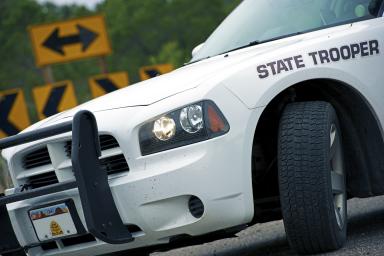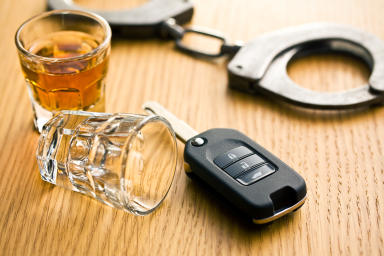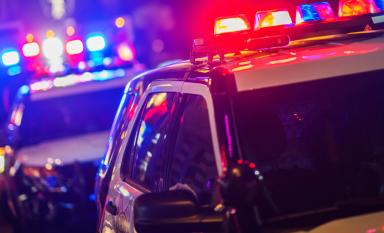Massachusetts OUI/DUI Laws

In 2021, sobriety checkpoints were deployed throughout Massachusetts, across 4,023 hours of high-visibility law enforcement. Under the Drive Sober or Get Pulled Over mobilization program by the state’s Highway Safety Division, there were 20,368 impaired driving traffic stops that year, leading to over 6,000 citations, 97 arrests for operating under the influence of alcohol, and six arrests for OUI drugs.
Despite these heightened efforts, the state recorded 582 total traffic fatalities in that same year, and 146 of these were due to alcohol-impaired drivers who surpassed the blood alcohol content legal limit of 0.08%. 92 of the fatalities were due to drivers who recorded a BAC of 0.15% or higher.
While Massachusetts impresses upon its residents the value of sober vehicle operation—reminding drivers that if they feel different, they will drive differently—the state remains stringent regarding the illegality of operating under the influence and its commensurately harsh sanctions. The following laws, regulations, and legal procedures govern OUIs and DUis in Massachusetts, underscoring the state’s message that impaired driving is a preventable crime.
General OUI Charge in Massachusetts
Under Massachusetts law, it is illegal to operate a motor vehicle in public areas while under the influence of alcohol and other controlled substances. The law’s definition of “controlled substances” extends to cannabis, narcotic drugs, depressants, stimulants, and toxic fumes.
The state uses the general term “operating under the influence,” and the first two offenses are classified as misdemeanors. A third OUI conviction is classified as a felony DUI.
Facing an OUI charge is a criminal procedure, and state prosecution bears the burden of proving the following factors beyond a reasonable doubt before a judge or jury:
The driver was operating a motor vehicle.
Note that a defendant does not need to be actively driving the vehicle, i.e., the car does not even need to be moving. The car could be parked and idling, or the driver could be in the car while the engine was not running, but Massachusetts law allows for these instances to be considered "operating" a vehicle.
The vehicle was in a public area.
The state has to prove that the car was in an area that any member of the public can reasonably access. Although the term "public way" typically applies to roads, it also includes places that are accessible to invitees (such as customers in a parking lot) or licensees (such as social guests).
The driver was under the influence of alcohol or other intoxicating substances, thus reducing their capacity to operate a vehicle safely.
The prosection must either prove that the driver had diminished capacity or opt for the “per se” alternative, where the defendant going beyond the legal BAC limit means that the prosecution does not need any other proof of a defendant’s diminished capacity. In Massachusetts, an individual is considered to be under the influence of alcohol if they have a blood alcohol content of 0.08% or higher.
Defenses mounted for operating under the influence can involve scrutinizing the legal definitions of “operating” and “public way,” though the third element is often a focus of OUI/DUI defense attorneys. Evidence stemming from the per se alternative, for example, relies on the discretion and procedural conduct of law enforcement officials when they carry out field sobriety tests.
The results of chemical testing for alcohol are not infallible either: in April 2023, the Supreme Judicial Court of Massachusetts decreed that 27,000 individuals who pleaded guilty to an OUI charge can have their pleas withdrawn and can get new trials. The court, after a thorough state investigation, found that breathalyzers were not calibrated properly from 2011 to 2019, rendering incorrect results.
Implied Consent Law for Massachusetts Drivers
Law enforcement officers can, with reasonable cause, flag drivers who they suspect are operating under the influence. Drivers pulled over for a possible OUI are automatically subject to Massachusetts’ implied consent law.
This is part of a driver’s pledged responsibility when they receive their driver’s license, in exchange for operating their vehicle on public roads. If the police officer who pulled them over asks them to undergo a roadside sobriety test or chemical testing for the presence of alcohol or illegal drugs in their system, drivers must agree to do so.
Blood Alcohol Content Legal Limit for Drivers
In Massachusetts, non-commercial car drivers over 21 who are found driving with a blood alcohol content of 0.08% or higher are considered to be operating their vehicles under the influence. It is illegal for them to use their vehicles, and law enforcement will confiscate their driver’s license and issue a notice of its immediate suspension.
The Massachusetts Registry of Motor Vehicles will be advised about your license seizure and immediate suspension from operating a car. There is no leeway like a notification grace period, and a temporary license will not be issued. This decision cannot be appealed at the RMV; instead, drivers must have their case heard at a district court.
Commercial vehicle drivers, such as school bus operators, have a 0.04% BAC legal limit. The state exercises zero tolerance for underage drivers: Those under 21 who are tested to have at least 0.02% blood alcohol content are automatically in violation of OUI laws.
Penalties for Refusing a Breath Test
Refusal to undergo a breath or blood test to prove or disprove your inebriation is in violation of the implied consent law. Refusal is not a criminal offense, but the administrative consequences are swift. Law enforcement will seize your license and issue a notice for its immediate suspension. Your car will also be impounded for a minimum of 12 hours.
Drivers must then attend a hearing with the state’s Department of Motor Vehicles for their refusal to take an alcohol breath test. Drivers who have no prior OUI conviction usually face 180 days of license suspension, while drivers with one prior OUI conviction and drivers under 21 can face three years of license suspension for their refusal.
Drivers who refuse testing and already have two prior OUI convictions will face five years of license suspension. Drivers who refuse testing and have three prior OUI convictions on record will have their license suspended and revoked for life.
Refusal to take alcohol testing is also often used as evidence in court to support a defendant’s state of inebriation and even their liability.
What Are the Penalties for an OUI/DUI in Massachusetts?
The state of Massachusetts adjusts its penalties for individuals convicted of operating under the influence according to any prior convictions and aggravating factors. Incarceration periods, fines, and other penalties increase with every consecutive offense. As with most criminal cases, penalties may be adjusted if there are plea negotiations.
The penalty ranges for OUI/DUI convictions in Massachusetts are as follows:
** First and second OUI offenses are classified as misdemeanors. Third offenses and higher are classified as felony DUIs. However, if a first or second OUI offense results in serious bodily harm to another person or death, it is elevated to a felony DUI.
In 2005, Melanie’s Law was passed to increase penalties for repeat offenders and to boost the role of driver education and treatment to avoid the recurrence of misconduct among transgressors. The measure immediately amended existing statutes on operating under the influence and is credited for the rising severity of sanctions for each consecutive offense. The law bears Melanie Powell's name, a 13-year-old victim of a repeat drunk driver.
Individuals convicted of OUI and felony DUI face administrative sanctions in addition to the above penalties, including the installation of ignition interlock devices on vehicles.
Ignition Interlock Devices
Drivers with an OUI conviction who are applying for a conditional “hardship” driver’s license and those reapplying after their license suspension are required to have an ignition interlock device installed on their vehicles. Because of Melanie’s Law, IID installation is an automatic requirement for drivers who have acquired two or more OUI convictions.
An IID is a breath alcohol monitoring device, and drivers must pass its breath test to start their vehicles. If the driver’s blood alcohol content is over 0.02%, then the car will not start. Re-tests must also be taken at intervals while operating the IID-equipped car.
The driver is responsible for paying for the IID’s installation, upkeep, and RMV administration fees. The IID must remain installed throughout the duration of the conditional period. Drivers with multiple OUI convictions must have the IID installed for an additional two years after the reinstatement of their driver’s license.
Massachusetts Dram Shop Law
Massachusetts legislation is straightforward about the role commercial establishments play in incidents concerning alcohol liability, particularly regarding personal injury lawsuits. Businesses that hold a liquor license, such as bars and restaurants, are not allowed to sell or deliver alcoholic beverages to minors or to already intoxicated persons.
Liability, under the state’s dram shop law, involves staff knowing that the customer wrongfully served was a minor or already intoxicated. As such, servers and wait staff keep an eye out for markers like slurred speech and monitor customers’ alcohol intake as an industry practice via methods usually based on an alcohol safety program called Training for Intervention Procedures. The TIPS program assists businesses in promoting safe alcohol consumption, with the added value of reducing their risk of exposure to liability lawsuits.
The state’s legal system recognizes that establishments that neglect to follow the state’s dram shop law contribute to incidents of over-inebriation that cause harm to others, such as drunk driving accidents.
Those who have incurred property damage or injury due to persons driving under the influence may have a recourse to compensation if they can prove that a bar or restaurant was legally irresponsible by providing an intoxicated person with more alcohol.
Compensation via Liquor Liability Insurance
In Massachusetts, places that serve alcohol must carry liquor liability insurance as part of the requirements for retaining a liquor license. The insurance covers claims arising from negligent actions, like the establishment’s improper serving of alcohol.
The minimum amount of liquor liability insurance is set at $250,000 to cover the bodily injury or death of one person and at $500,000 to cover one accident that results in the injury or death of more than one person.
Claimants, such as drunk driving victims under the state’s dram shop law, are entitled to information about the liability coverage limits of an establishment. They can also bring a negligence action or lawsuit to court to hold an erring business accountable for how its improper serving of alcohol to minors or already intoxicated persons has harmed others.
How Much Can Someone Sue for a Drunk Driving Injury in Massachusetts?
The charges and subsequent penalties outlined above are applied to criminal cases filed by state prosecution against individuals charged with OUI. However, victims of drunk driving incidents have the option of filing a personal injury lawsuit to pursue compensation for property damage, bodily injury, and wrongful death caused by a drunk driver.
Settlement amounts vary, though some Massachusetts car accident attorneys report a benchmark of $25,000, often due to insurance policy limits. This threshold may be prohibitive for victims who have suffered more considerable losses.
For OUI/DUI victims who wish to bring their case to court, the compensation amount will vary, as this is based on distinct factors of the incident and the allocation of liability for each party. In July 2023, for example, a jury awarded $8.9 million to a victim of a drunk driver; the plaintiff had faced off against the defendant, who was already facing a felony DUI charge, and the defendant's insurance company.
Note that the state follows the modified comparative negligence state for car accident lawsuits. This means that plaintiffs are eligible to receive damages even if they share responsibility for the incident. This system also allows for compensation to be disbursed according to each party’s allocation of fault, and a defendant’s criminal OUI charge over the incident in question is allowed to be used as proof of their liability.
The Statute of Limitations in Massachusetts
Victims of drunk driving generally have three years from the date of the incident to bring a personal injury lawsuit against the erring driver. Plaintiffs must file their lawsuit within this timeframe, or their case cannot be heard in court.
Rare exceptions apply to this legal deadline. For plaintiffs who were minors at the time of the incident, the clock does not start ticking until they reach the age of majority, which is 18 in Massachusetts. Victims who are deemed mentally incompetent by the court also have a stopped clock until they regain legal competence. The statute of limitations is also paused if the defendant leaves the state.
Resources for Individuals Injured by an Impaired Driver in Massachusetts
Massachusetts Office for Victim Assistance
MOVA is an independent state agency maintained by the Victim and Witness Assistance Board. It carries out advocacy programs for enhanced victim rights and runs on survivor-focused and trauma-informed principles. Its AskMOVA microsite welcomes queries from Massachusetts residents who are survivors of violent crimes, at no cost. AskMOVA has a dedicated section for survivors of motor vehicle injuries and homicides.
Civil Legal Aid for Victims of Crime Initiative
The Civil Legal Aid for Victims of Crime Initiative helps Massachusetts individuals with their civil legal problems that are a direct result of the crime they survived. It also offers emotional support resources, financial assistance, education and employment assistance, and housing advocacy. The CLAVC Initiative is supported by the Massachusetts Office for Victim Assistance. People with incomes at or below 125% of the federal poverty level, or an annual income at or below $37,500 for a family of four, are eligible for civil legal aid.
Massachusetts Victims of Violent Crime Compensation
The Massachusetts Attorney General’s Office maintains a Victim Compensation and Assistance Division, which provides financial assistance to survivors of violent crime. It offers monetary aid to eligible individuals to cover expenses like uninsured medical and dental care, mental health counseling, funeral and burial costs, and income lost due to the inability to work.
Mothers Against Drunk Driving Massachusetts
MADD Massachusetts is the state arm of the nationwide nonprofit that was founded to curb the incidence of fatalities due to drunk and drugged driving. It offers OUI victims and their surviving families assistance at no cost, including crisis services, emotional support programs, victim-focused legal guidance on criminal and civil justice systems, and advocacy like accompanying survivors in court appearances and assisting them with victim impact statements.
Massachusetts Legal Assistance Corporation
The Massachusetts Legal Assistance Corporation, established in 1983, is the largest funding source for civil legal aid organizations in the state. MLAC provides free legal assistance—by way of information, advice, and representation—to low-income individuals and families that are facing critical, non-criminal (civil) legal issues. Massachusetts citizens with incomes at or below 125% of the federal poverty level are eligible for civil legal aid.
Expertise.com StaffAuthor
Step into the world of Expertise.com, your go-to hub for credible insights. We don't take accuracy lightly around here. Our squad of expert reviewers, each a maestro in their field, has given the green light to every single article you'll find. From rigorous fact-checking to meticulous evaluations of service providers, we've got it all covered. So feel free to dive in and explore. The information you'll uncover has been stamped with the seal of approval by our top-notch experts.




